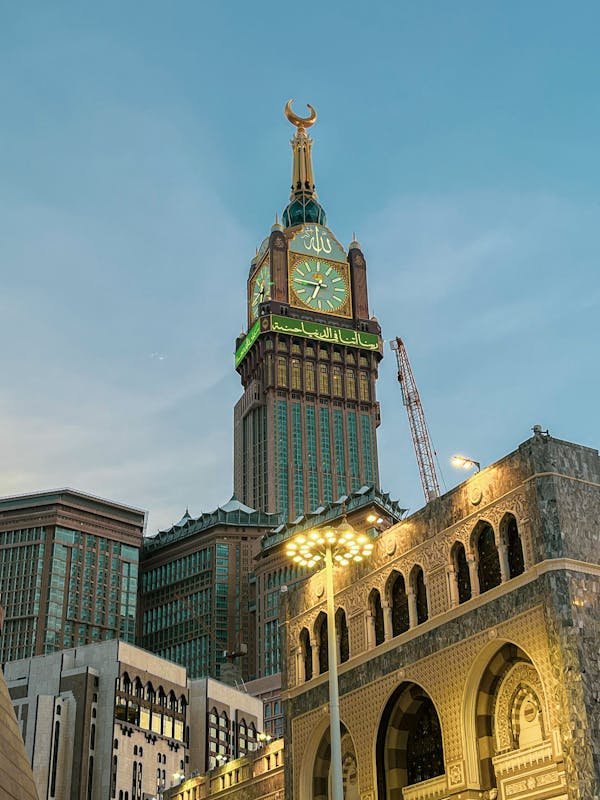3. Features :
Observation Deck :
The tower houses an observation deck on the 77th floor, offering panoramic views of
Mecca and the surrounding areas, including the Masjid al-Haram and the Kaaba.
Luxury Hotel :
The building includes the Fairmont Makkah Clock Royal Tower hotel, which offers luxurious
accommodations for pilgrims and visitors to Mecca.
Shopping Center :
Al Abraj Tower also contains a large shopping mall with various retail outlets,
restaurants, and cafes, catering to the needs of pilgrims and tourists.
Convention Center :
The tower is equipped with facilities for conferences and events, accommodating both
local and international gatherings.
4. Cultural and Religious Significance :
Landmark :
Al Abraj Tower has become an iconic landmark in Mecca, symbolizing the city’s modernization
while serving as a reminder of its deep historical and religious significance.
Proximity to Masjid al-Haram :
Its location next to the Masjid al-Haram enhances its importance, as it is
easily accessible for pilgrims who come for Hajj and Umrah.
Illumination During Events :
The tower’s clock face is often illuminated during Islamic events and
celebrations, making it a focal point for festivities in Mecca.
5. Technological Innovations :
Smart Building Features :
Al Abraj Tower incorporates advanced technology for energy efficiency and
sustainability, including smart elevators and climate control systems.
Timing System :
The clock is synchronized with the Islamic lunar calendar, providing the correct prayer
times for the local community and pilgrims.
6. Historical Context :
Vision for Development :
The tower is part of a larger development project aimed at modernizing Mecca’s
infrastructure and enhancing the experience for millions of pilgrims who visit each year.
Contrast with Traditional Structures :
While the tower represents modernity, it contrasts with the
historic buildings in the area, showcasing the balance between preserving tradition and embracing
progress.
7. Visitor Experience :
Access to the Observation Deck :
Visitors can access the observation deck for a fee, allowing them to
take in stunning views of Mecca and participate in photography opportunities.
Dining and Shopping :
The shopping mall within Al Abraj Tower offers a variety of dining options, from
fast food to fine dining, and a range of retail shops selling traditional and modern products.
8. Transportation and Accessibility :
Public Transport :
The tower is well-connected to public transportation, making it easy for pilgrims to
reach Masjid al-Haram and other nearby attractions.
Parking Facilities :
Al Abraj Tower has parking facilities for guests and visitors, ensuring convenience
for those driving to the area.
9. Impact on Mecca :
Tourism Boost :
The presence of the Clock Tower has contributed to increased tourism in Mecca, attracting
visitors not only for religious purposes but also for leisure and business.
Economic Development :
The tower has spurred economic growth in the surrounding area, with new
businesses, hotels, and services catering to the needs of pilgrims and tourists.
Conclusion :
Al Abraj Tower, or the Clock Tower, stands as a testament to the blend of tradition and modernity in
Mecca. It serves as an essential hub for pilgrims, offering luxurious accommodations, shopping, and
stunning views of the holy city. As one of the tallest buildings in the world, it represents the vision
of modern development while maintaining its connection to the rich historical and religious heritage of
Islam. Its proximity to the Masjid al-Haram ensures that it will remain a significant part of the Meccan
landscape for generations to come.



